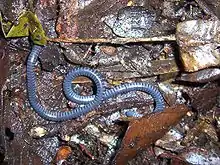Boulengerula
Boulengerula is a genus of amphibians in the family Herpelidae.[1][2] They are found in East Africa.[1][3] They are sometimes known as Boulenger's caecilians or Usambara bluish-gray caecilians.[1]
| Boulengerula | |
|---|---|
 | |
| Boulengerula taitanus | |
| Scientific classification | |
| Domain: | Eukaryota |
| Kingdom: | Animalia |
| Phylum: | Chordata |
| Class: | Amphibia |
| Order: | Gymnophiona |
| Clade: | Apoda |
| Family: | Herpelidae |
| Genus: | Boulengerula Tornier, 1896 |
| Species | |
|
8 species (see text) | |
| Synonyms[1] | |
|
Afrocaecilia Taylor, 1968 | |
Ecology
Boulengerula taitana feeds on earthworms, termites, dipteran larvae and other soil macrofauna. Presumably other Boulengerula have similar diets.[4]
Species
There are eight species:[1][2]
| Binomial name and author | Common name |
|---|---|
| Boulengerula boulengeri Tornier, 1896 | Boulenger's caecilian, Usambara bluish-gray caecilian |
| Boulengerula changamwensis Loveridge, 1932 | Changamwensis African caecilian, Changamwe lowland caecilian, Changamwe caecilian |
| Boulengerula denhardti Nieden, 1912 | |
| Boulengerula fischeri Nussbaum & Hinkel, 1994 | |
| Boulengerula niedeni Müller, Measey, Loader, & Malonza, 2005 | |
| Boulengerula spawlsi Wilkinson, Malonza, Campbell, and Loader, 2017 | |
| Boulengerula taitana Loveridge, 1935 | Taita African caecilian, Taita Mountains caecilian |
| Boulengerula uluguruensis Barbour & Loveridge, 1928 | Uluguru African caecilian, Uluguru pink caecilian |
References
- Frost, Darrel R. (2018). "Boulengerula Tornier, 1896". Amphibian Species of the World: an Online Reference. Version 6.0. American Museum of Natural History. Retrieved 22 May 2018.
- "Herpelidae". AmphibiaWeb. University of California, Berkeley. 2018. Retrieved 22 May 2018.
- Zug, G.R., Vitt, L.V., & Caldwell, J.P. Herpetology: An Introductory Biology of Amphibians and Reptiles, Second Edition. San Diego: Academic Press, 2001. 370.
- Gaborieau, O. & Measey, G.J. (2004). "Termitivore or detritivore? A quantitative investigation into the diet of the East African caecilian Boulengerula taitanus (Amphibia: Gymnophiona: Caeciliidae)" (PDF). Animal Biology. 54: 45–56. doi:10.1163/157075604323010042. Archived from the original (PDF) on 2014-05-25.
This article is issued from Wikipedia. The text is licensed under Creative Commons - Attribution - Sharealike. Additional terms may apply for the media files.